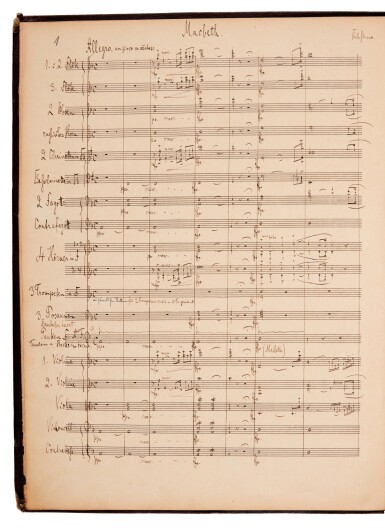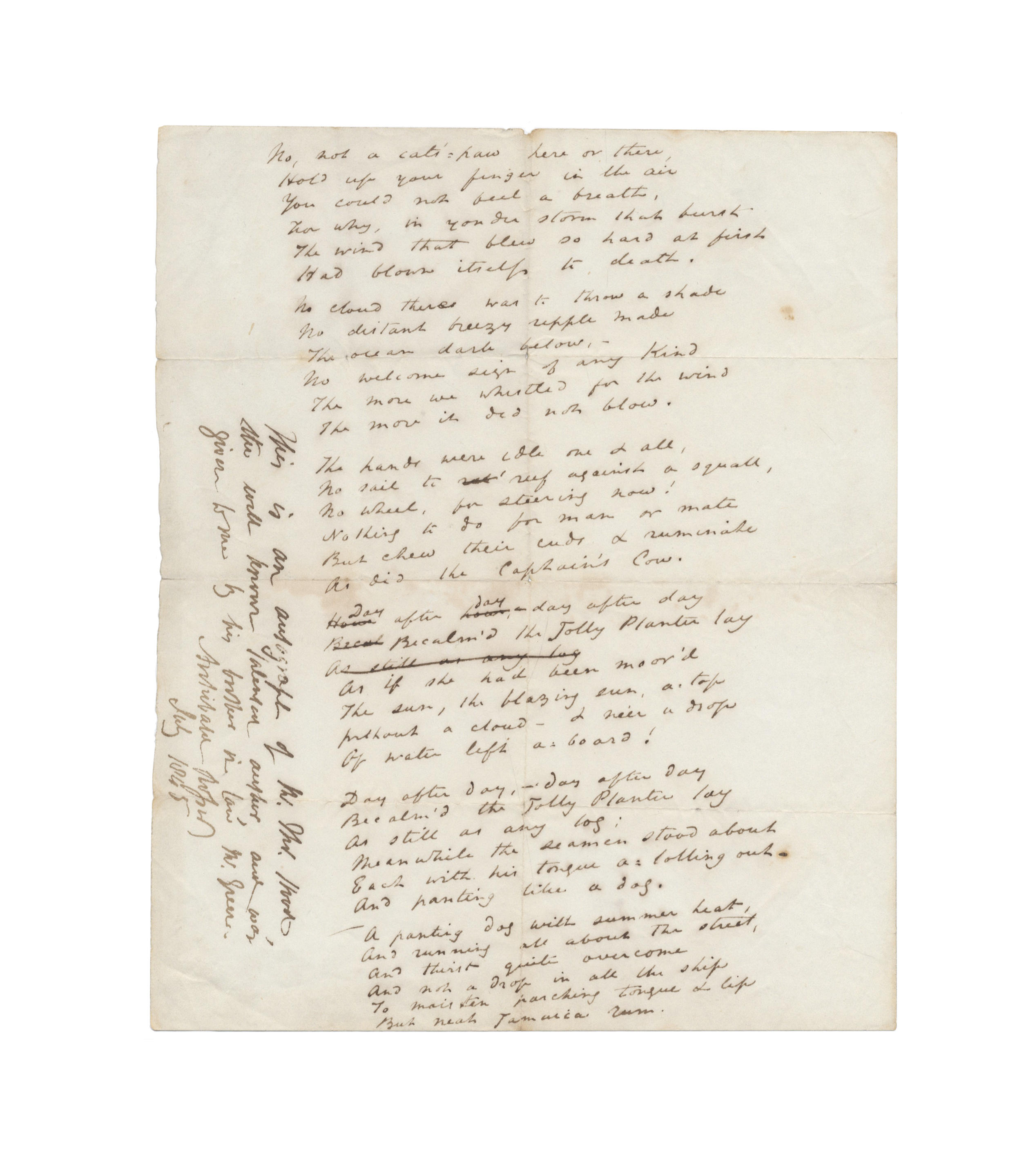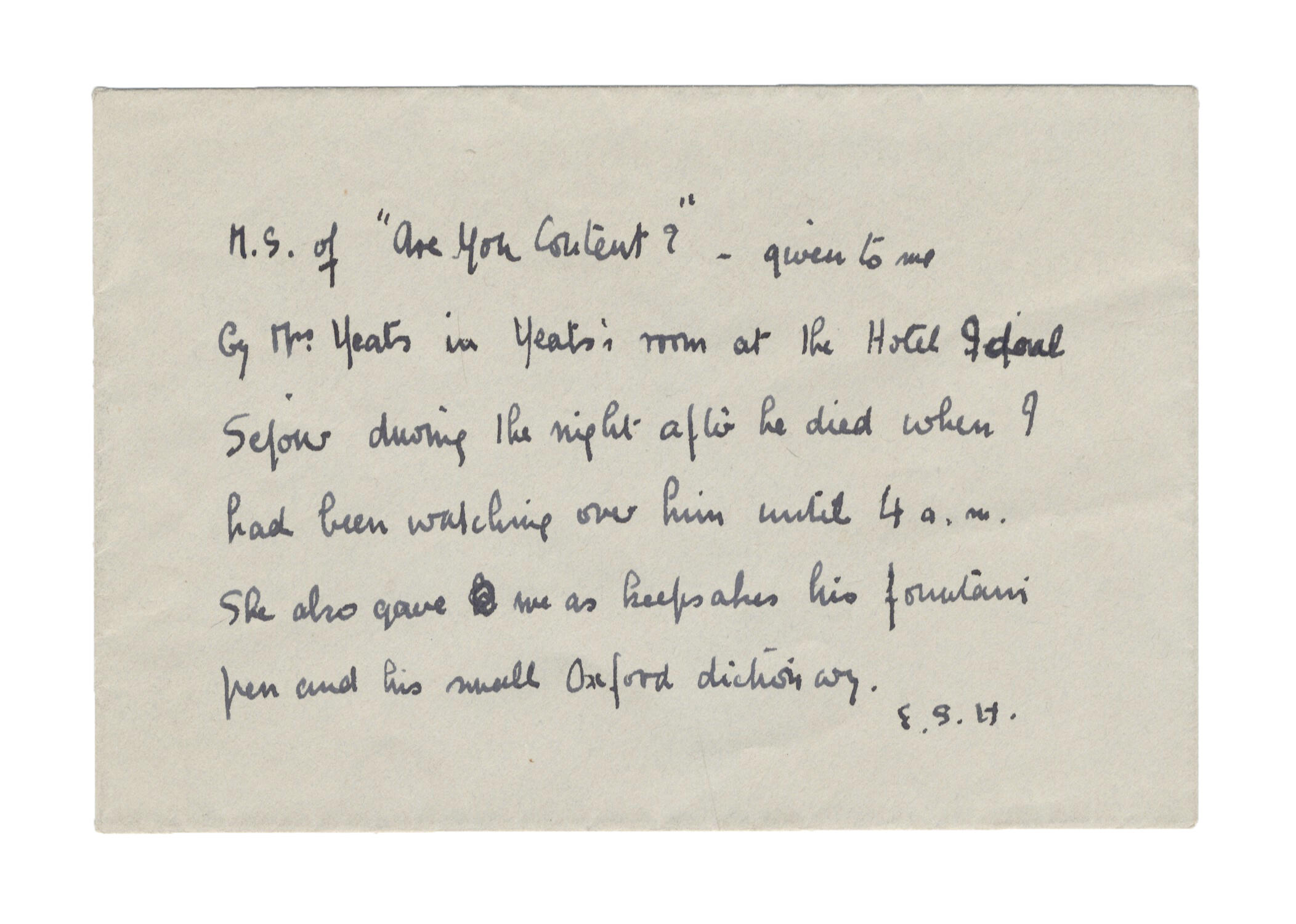AUTOGRAPH REVISED MANUSCRIPT OF HIS CELEBRATED POEM 'STOP ALL THE CLOCKS', signed ('W.H. Auden'), entitled here 'Blues', 16 lines in four four-line stanzas, with two currente calamo corrections, 1 page, folio, somewhat jagged left-hand edge where presumably removed from a ledger [?1937] 'Stop all the clocks, cut off the telephone; Prevent the dog from barking with a juicy bone; Silence the pianos, and with muffled drum Bring out the coffin, let the mourners come... He was my North, my South, and East and West, My working week, and my Sunday rest; My moon, my midnight, my talk, my song; I thought that love would last for ever: I was wrong' 'Stop all the clocks' is probably Auden's best known poem, following its use in the film 'Four Weddings and a Funeral'. The song was first composed as a burlesque dirge of five verses on the death of a secular saviour in The Ascent of F6 (1936) where it ended with three verses that formed part of the plot of the play. The next time it appeared in print, in Another Time (1940), it was as a cabaret song of four verses with the title 'Funeral Blues'. It was then in its final state (although the title was to be dropped in Collected Poems) with the last three verses replaced by two new ones, as in this manuscript. [This is surely one occasion on which the critics would unite in not condemning Auden's customary practice of revising his work even after publication]. The two replacement verses would seem to owe something to that magnificent Irish lament 'Donal Og', of which Auden would have been aware from his reading of Yeats, and which ends in the translation by Lady Gregory: 'You have taken the East from me; you have taken the West from me; you have taken what is before me and what is behind me you have taken the moon, you have taken the sun from me and my fear is great that you have taken God from me!' It is clear from the accompanying letter mentioned below and bearing a tentative date of Spring 1937 in pencil in another hand that the present manuscript was submitted possibly for publication in an anthology for schools, a circumstance that no doubt accounts for its unusual legibility. Auden's normal handwriting has been described as the sort that 'an airborne daddy-longlegs might have managed with a dangling leg'. In its roughest form, particularly when in pencil, Auden's hand degenerates into a personal shorthand that almost defies interpretation, except through a combination of guesswork based on the context and rhyming scheme and the deployment of skills more commonly associated with one of his favoured pastimes, the crossword. He was habitually careless with punctuation marks, perhaps rightly regarding them as 'breathing indications', although much of his punctuation in the present manuscript is to be preferred over that in the final version. The use of the brief interim title 'Blues' may help to date this manuscript between the publication of The Ascent of F6 and Another Time. The paper it is written on was evidently torn out of one of the tall notebooks for which Auden had a preference. The present manuscript has the reading 'and' in line 9 which seems weaker than the repetition of 'my' for the third time as in the printed text, and 'could' in line 12 for 'would'. It is difficult to be sure quite what happened in line 2, but it may be that Auden began to misspell the word 'guard', crossed out 'ga', wrote the first letter again, but immediately deleted it on realising that he did not need any word at all to qualify 'dog'. The repetition of 'ocean' in the penultimate line of the poem is probably explained by his not having written the word clearly enough the first time. 'Woods' in the same line seems to have been just a mistake, given its rhyme with singular 'good'. The poem shares with Auden's euphoric 'A Summer Night' an unselfconscious freedom in its association of images not often indulged in his work; and they both contain references to the four points of the compass ('Now North and Sou
AUTOGRAPH REVISED MANUSCRIPT OF HIS CELEBRATED POEM 'STOP ALL THE CLOCKS', signed ('W.H. Auden'), entitled here 'Blues', 16 lines in four four-line stanzas, with two currente calamo corrections, 1 page, folio, somewhat jagged left-hand edge where presumably removed from a ledger [?1937] 'Stop all the clocks, cut off the telephone; Prevent the dog from barking with a juicy bone; Silence the pianos, and with muffled drum Bring out the coffin, let the mourners come... He was my North, my South, and East and West, My working week, and my Sunday rest; My moon, my midnight, my talk, my song; I thought that love would last for ever: I was wrong' 'Stop all the clocks' is probably Auden's best known poem, following its use in the film 'Four Weddings and a Funeral'. The song was first composed as a burlesque dirge of five verses on the death of a secular saviour in The Ascent of F6 (1936) where it ended with three verses that formed part of the plot of the play. The next time it appeared in print, in Another Time (1940), it was as a cabaret song of four verses with the title 'Funeral Blues'. It was then in its final state (although the title was to be dropped in Collected Poems) with the last three verses replaced by two new ones, as in this manuscript. [This is surely one occasion on which the critics would unite in not condemning Auden's customary practice of revising his work even after publication]. The two replacement verses would seem to owe something to that magnificent Irish lament 'Donal Og', of which Auden would have been aware from his reading of Yeats, and which ends in the translation by Lady Gregory: 'You have taken the East from me; you have taken the West from me; you have taken what is before me and what is behind me you have taken the moon, you have taken the sun from me and my fear is great that you have taken God from me!' It is clear from the accompanying letter mentioned below and bearing a tentative date of Spring 1937 in pencil in another hand that the present manuscript was submitted possibly for publication in an anthology for schools, a circumstance that no doubt accounts for its unusual legibility. Auden's normal handwriting has been described as the sort that 'an airborne daddy-longlegs might have managed with a dangling leg'. In its roughest form, particularly when in pencil, Auden's hand degenerates into a personal shorthand that almost defies interpretation, except through a combination of guesswork based on the context and rhyming scheme and the deployment of skills more commonly associated with one of his favoured pastimes, the crossword. He was habitually careless with punctuation marks, perhaps rightly regarding them as 'breathing indications', although much of his punctuation in the present manuscript is to be preferred over that in the final version. The use of the brief interim title 'Blues' may help to date this manuscript between the publication of The Ascent of F6 and Another Time. The paper it is written on was evidently torn out of one of the tall notebooks for which Auden had a preference. The present manuscript has the reading 'and' in line 9 which seems weaker than the repetition of 'my' for the third time as in the printed text, and 'could' in line 12 for 'would'. It is difficult to be sure quite what happened in line 2, but it may be that Auden began to misspell the word 'guard', crossed out 'ga', wrote the first letter again, but immediately deleted it on realising that he did not need any word at all to qualify 'dog'. The repetition of 'ocean' in the penultimate line of the poem is probably explained by his not having written the word clearly enough the first time. 'Woods' in the same line seems to have been just a mistake, given its rhyme with singular 'good'. The poem shares with Auden's euphoric 'A Summer Night' an unselfconscious freedom in its association of images not often indulged in his work; and they both contain references to the four points of the compass ('Now North and Sou













Testen Sie LotSearch und seine Premium-Features 7 Tage - ohne Kosten!
Lassen Sie sich automatisch über neue Objekte in kommenden Auktionen benachrichtigen.
Suchauftrag anlegen